- Clone
- M-A251 (See other available formats)
- Regulatory Status
- RUO
- Workshop
- IV A053
- Other Names
- IL-2 receptor α chain, Low affinity IL-2R, IL-2Rα chain
- Isotype
- Mouse IgG1, κ
- Ave. Rating
- Submit a Review
- Product Citations
- publications
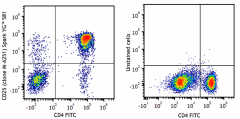
-

PHA-stimulated (3 days) human peripheral blood lymphocytes were stained with anti-human CD4 FITC and anti-human CD25 (clone M-A251) Spark YG™ 581 (left) or CD4 FITC only (right). -

Human peripheral blood lymphocytes were stained with anti-human CD4 FITC and anti-human CD25 (clone M-A251) Spark YG™ 581 (left) or anti-human CD4 FITC only (right).
| Cat # | Size | Price | Quantity Check Availability | Save | ||
|---|---|---|---|---|---|---|
| 356153 | 25 tests | 100€ | ||||
| 356154 | 100 tests | 212€ | ||||
CD25 is a 55 kD type I transmembrane glycoprotein also known as low affinity IL-2 receptor α chain or Tac. It is expressed on progenitor lymphocytes, activated T and B cells, and activated monocytes/macrophages. CD25 is also expressed on a subset of non-stimulated CD4+ T cells termed T regulatory cells. Soluble CD25/IL-2Rα is produced as a consequence of lymphocyte stimulation and is found in biological fluids following inflammatory responses. CD25 associates with IL-2 receptor β (CD122) and common γ (CD132) chains to form a high affinity IL-2R complex.
Product DetailsProduct Details
- Verified Reactivity
- Human
- Reported Reactivity
- Baboon, Cynomolgus, Rhesus
- Antibody Type
- Monoclonal
- Host Species
- Mouse
- Immunogen
- Human PHA-induced lymphocyte cells
- Formulation
- Phosphate-buffered solution, pH 7.2, containing 0.09% sodium azide and BSA (origin USA)
- Preparation
- The antibody was purified by affinity chromatography and conjugated with Spark YG™ 581 under optimal conditions.
- Concentration
- Lot-specific (to obtain lot-specific concentration and expiration, please enter the lot number in our Certificate of Analysis online tool.)
- Storage & Handling
- The antibody solution should be stored undiluted between 2°C and 8°C, and protected from prolonged exposure to light. Do not freeze.
- Application
-
FC - Quality tested
- Recommended Usage
-
Each lot of this antibody is quality control tested by immunofluorescent staining with flow cytometric analysis. For flow cytometric staining, the suggested use of this reagent is 5 µL per million cells in 100 µL staining volume or 5 µL per 100 µL of whole blood. It is recommended that the reagent be titrated for optimal performance for each application.
* Spark YG™ 581 has a maximum excitation of 562 nm and a maximum emission of 581 nm. - Excitation Laser
-
Green Laser (532 nm)/Yellow-Green Laser (561 nm)
- Application Notes
-
Additional reported applications (for the relevant formats) include: immunohistochemical staining of paraformaldehyde fixed frozen sections1 and spatial biology (IBEX)2,3.
The CD25 molecule reveals three epitope regions: A, B, and C. M-A251 antibody recognizes epitope region B. Unlike other CD25 antibody clones, M-A251 can detect CD25 after fixation with paraformaldehyde. -
Application References
(PubMed link indicates BioLegend citation) - RRID
-
AB_2890784 (BioLegend Cat. No. 356153)
AB_2890784 (BioLegend Cat. No. 356154)
Antigen Details
- Structure
- Type I transmembrane glycoprotein, 55 kD; low-affinity IL-2 receptor α chain
- Distribution
-
Activated T and B cells, monocytes/macrophages, Tregs
- Interaction
- Associates with IL-2Rβ/CD122 and IL-2Rγ/CD132 receptor chains to form a high-affinity IL-2R complex
- Ligand/Receptor
- IL-2
- Cell Type
- B cells, Macrophages, Monocytes, T cells, Tregs
- Biology Area
- Cell Biology, Immunology, Neuroscience, Neuroscience Cell Markers
- Molecular Family
- CD Molecules, Cytokine/Chemokine Receptors
- Antigen References
-
1. Knapp W, et al. 1989. Leucocyte Typing IV: White Cell Differentiation Antigens. Oxford University Press.
2. Schlossman S, et al. 1995. Leucocyte Typing V: White Cell Differentiation Antigens. Oxford University Press.
3. Barclay N, et al. 1997. The Leukocyte Antigen FactsBook. Academic Press Inc.
4. Taniguchi T and Minami Y. et al. 1993. Cell 73:5.
5. Waldmann T. 1991. J. Biol. Chem. 266:2681. - Gene ID
- 3559 View all products for this Gene ID
- UniProt
- View information about CD25 on UniProt.org
Related FAQs
Other Formats
View All CD25 Reagents Request Custom ConjugationCompare Data Across All Formats
This data display is provided for general comparisons between formats.
Your actual data may vary due to variations in samples, target cells, instruments and their settings, staining conditions, and other factors.
If you need assistance with selecting the best format contact our expert technical support team.
-
APC/Cyanine7 anti-human CD25
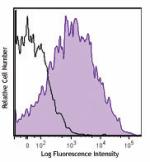
PHA-stimulated (3 days) human peripheral blood lymphocytes w... -
Purified anti-human CD25
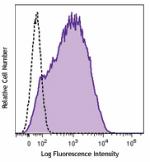
PHA-stimulated (3 day) human peripheral blood lymphocytes we... -
PE anti-human CD25
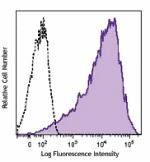
PHA-stimulated (3 day) human peripheral blood lymphocytes we... -
FITC anti-human CD25
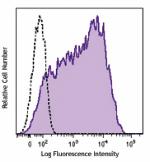
PHA-stimulated (3 day) human peripheral blood lymphocytes we... -
PE/Cyanine7 anti-human CD25
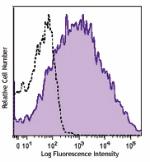
PHA-stimulated (3 days) human peripheral blood lymphocytes w... -
APC anti-human CD25
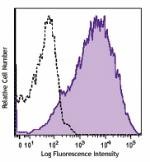
PHA-stimulated (3 days) human peripheral blood lymphocytes w... -
PerCP/Cyanine5.5 anti-human CD25
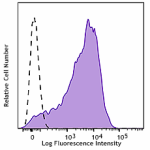
PHA-stimulated (3 days) human peripheral blood lymphocytes w... -
Brilliant Violet 421™ anti-human CD25
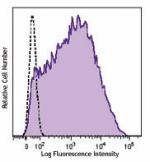
PHA-stimulated (3 days) human peripheral blood lymphocytes w... -
Alexa Fluor® 488 anti-human CD25
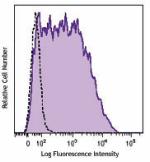
PHA-stimulated (3 days) human peripheral blood lymphocytes w... -
Alexa Fluor® 700 anti-human CD25
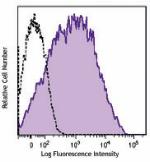
PHA-stimulated (3 days) human peripheral blood lymphocytes w... -
Brilliant Violet 510™ anti-human CD25
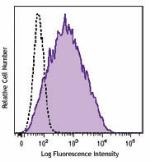
PHA-stimulated (3 days) human peripheral blood lymphocytes w... -
PE/Dazzle™ 594 anti-human CD25
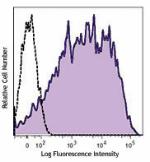
PHA-stimulated (3 days) human peripheral blood lymphocytes w... -
Biotin anti-human CD25
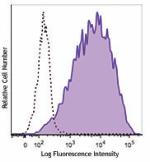
PHA-stimulated (3 days) human peripheral blood lymphocytes w... -
Alexa Fluor® 647 anti-human CD25
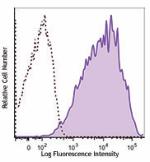
PHA-stimulated (3 days) human peripheral blood lymphocytes w... 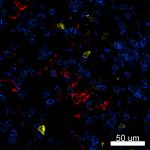
Confocal image of human lymph node sample acquired using the... -
Pacific Blue™ anti-human CD25
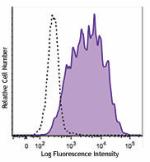
PHA-stimulated (3 days) human peripheral blood lymphocytes w... -
PerCP anti-human CD25
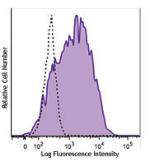
PHA-stimulated (3 days) human peripheral blood lymphocytes w... -
APC/Fire™ 750 anti-human CD25
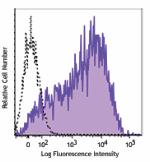
PHA-stimulated (3 days) human peripheral blood lymphocytes w... -
Brilliant Violet 711™ anti-human CD25
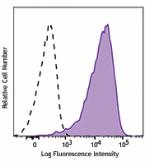
PHA-stimulated (3 days) human peripheral blood lymphocytes w... -
Brilliant Violet 785™ anti-human CD25
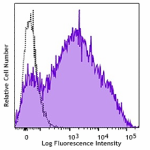
PHA-stimulated (3 days) human peripheral blood lymphocytes w... -
Brilliant Violet 605™ anti-human CD25
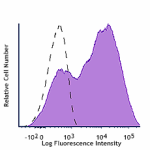
PHA-stimulated (3 days) human peripheral blood lymphocytes w... 
Human peripheral blood lymphocytes were stained with CD4 APC... -
KIRAVIA Blue 520™ anti-human CD25

PHA-stimulated (3 days) human peripheral blood lymphocytes w... 
Human peripheral blood lymphocytes were stained with CD4 APC... -
PE/Fire™ 700 anti-human CD25

PHA-stimulated (3 days) human peripheral blood lymphocytes w... 
Human peripheral blood lymphocytes were stained with anti-hu... -
APC/Fire™ 810 anti-human CD25

PHA-stimulated (3 days) human peripheral blood lymphocytes w... 
Human peripheral blood lymphocytes were stained with CD4 Bri... -
Spark NIR™ 685 anti-human CD25 Antibody

Human peripheral blood lymphocytes were stained with CD4 FIT... -
Spark YG™ 581 anti-human CD25

PHA-stimulated (3 days) human peripheral blood lymphocytes w... 
Human peripheral blood lymphocytes were stained with anti-hu... -
PE/Fire™ 640 anti-human CD25 Antibody

PHA-stimulated (3 days) human peripheral blood lymphocytes w... 
Human peripheral blood lymphocytes were stained with CD4 Bri... -
PE anti-human CD25
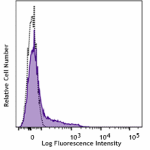
Typical results from human peripheral blood lymphocytes stai... -
PerCP/Cyanine5.5 anti-human CD25
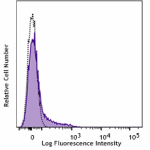
Typical results from human peripheral blood lymphocytes stai... -
APC/Fire™ 750 anti-human CD25
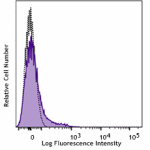
Typical results from human peripheral blood lymphocytes stai... -
PE/Cyanine7 anti-human CD25
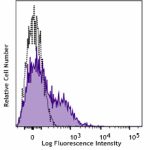
Typical results from human peripheral blood lymphocytes stai... -
APC anti-human CD25
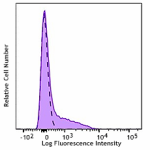
Typical results from human peripheral blood lymphocytes stai... -
PE/Cyanine5 anti-human CD25

Human peripheral blood lymphocytes were stained with anti-hu... -
FITC anti-human CD25
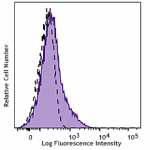
Typical results from human peripheral blood lymphocytes stai... -
Spark Red™ 718 anti-human CD25

Human peripheral blood lymphocytes were stained with anti-hu... -
GMP PE anti-human CD25
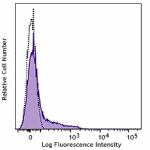
Typical results from human peripheral blood lymphocytes stai... -
GMP PE/Cyanine7 anti-human CD25
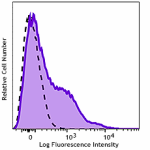
Typical results from human peripheral blood lymphocytes stai... -
PerCP/Fire™ 780 anti-human CD25

Human peripheral blood lymphocytes were stained with anti-hu... -
PE/Fire™ 744 anti-human CD25

PHA-stimulated (3 days) human peripheral blood mononuclear c... 
Human peripheral blood mononuclear cells were stained with a... -
PerCP/Fire™ 806 anti-human CD25

Human peripheral blood lymphocytes were stained with anti-hu... -
Brilliant Violet 650™ anti-human CD25

Human peripheral blood lymphocytes were stained with anti-hu...
 Login / Register
Login / Register 













Follow Us